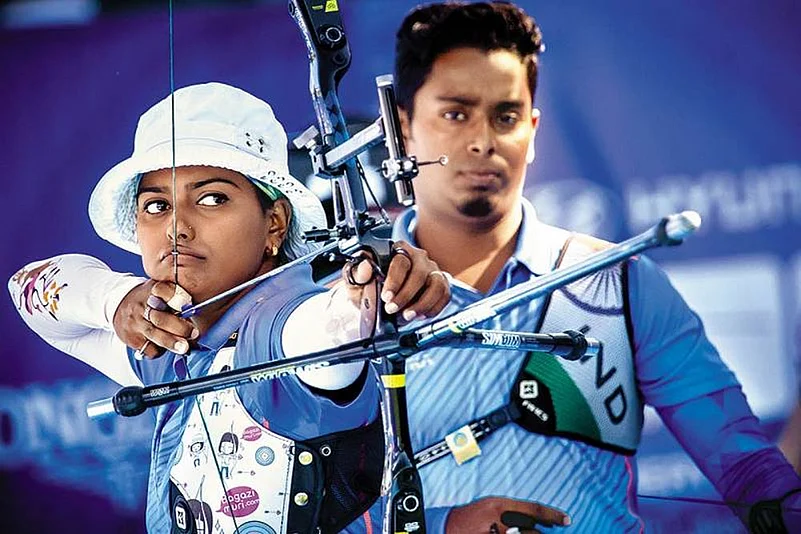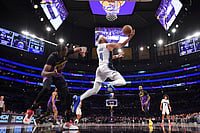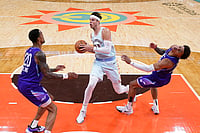From being rejected as an emaciated 12-year-old kid, to throwing a challenge to prove herself in three months' time to India's top medal prospect at Tokyo Olympics, world no 1 archer Deepika Kumari is a story of grits, guts and gumption.
A journey that started from Arjun Munda's Academy in Kharsawan, a small town surrounded by the idyllic Chandil-Gamharia forest range, rose to prominence at the Tata Archery Academy which later became her 'second home'.
It all began during the summer of 2006, when Deepika visited her best friend-cum-cousin Deepti Kumari at Lohardaga, about 70kms from her hometown at Ratu in Ranchi during her vacations.
Deepika thought to take up archery and follow the footsteps of her cousin to reduce the financial burden of her father, an autorickshaw driver and mother who used to work as a nurse.
After returning to Ranchi, she and her parents, Shivnarayan and Geeta Mahato, visited Meera Munda, wife of then Jharkhand chief minister Arjun Munda to request her to enroll Deepika at their academy in Kharsawan.
"Tumse to bhari dhanush hai, yeh sab nahin hoga tumse! (You can't do this, even the bow looks heavier than you!)," Meera Munda had told Deepika.
However, her parents somehow managed to convince Meera, who then asked the academy coaches to take a trial for Deepika.
Riding pillion on motorcycle with her father, Deepika reached the academy but there too she faced rejection from the academy coaches B Srinivas Rao and Himanshu Mohanty, recalled Sumanta Chandra Mohanty, the secretary of Saraikela-Kharsawan Archery Association.
However, unfazed Deepika again went to meet Munda's wife.
"This time, she took a three-month challenge to prove herself at the academy and Meera Ji wrote a letter in official capacity to enroll her," Mohanty said in an interaction with PTI at Kharsawan.
"Usme jaan hi nahin thi (she looked very weak). The only brightest thing was her structure looked in shape for archery -- long, straight limbs, perfect anchor," Rao said.
Himanshu added: "You need strength and stamina for archery. She looked a complete misfit but there was determination in her eyes and she worked really, really hard to prove all of us wrong."
A strict disciplinarian from a very young age, Deepika would be the first to come to the ground and start her drills.
"She would always do it two times of what she was told during the drills. With her frail structure, her body would easily give up, but she would keep running, doing other drills, double than others," her batch mate at the academy, Sumit Mishra, a former India compound archer, recollected.
She was not perfect skillwise, but she gave it all to rectify her mistakes.
"Her anchor -- position of the hand underneath the face with a fully drawn bow -- was not happening right. But the next day she started shooting perfectly.
"I could not believe my eyes. Deepika then told me she did not sleep at night and kept practising with a tube in front of a mirror," Himanshu recalled.
Looking at her keenness, the staff would give special attention to her diet.
Deepika along with other academy girls would stay at the house of Mohanty, while the boys lived at Munda's house nearby.
"She was never fond of rice so we would make chapatis especially for her. In the afternoon, she would climb up the guava tree and evenings would be spent watching TV with my father in the hall. She became part of our family in no time," Rao said.
"She started beating boys of her age within a month's time and there was no looking back for her."
Deepika made her debut at sub-junior nationals in Jabalpur in 2007 but only to return empty-handed. It was only at Vijaywada, where she tasted her first success with a gold medal.
"She has not stopped since then," Rao said.
A brainchild of current Archery Association of India president Munda, the academy, came into existence with its first batch comprising about 60 kids at the ground of the ancient Maa Dama Dari temple in Khelarisahi.
It has so far produced about 30 international archers, including Mishra, Manjudha Soy and Gora Ho among others.
"Deepika always asked us to offer a coconut at the ancient temple during her tournaments. This time too, there will be special puja offerings here for her Olympics success," said Mohanty.
"Sapna zaroor dekhiye, humne sapna haqiqat mein badalte hue dekha hai -- dreams do become reality."
Deepika's journey next had a stopover at the TAA in Jamshedpur where she honed her skills under coaches Dharmendra Tiwary and Purnima Mahato.
Deepika spent about 11 years at the TAA and it was like her second home, said hostel warden Kuntala Paul, pointing at the first floor where she stayed during her training days.
"Be it helping in cooking, making my hair-do, or surprising everyone with her amazing rangoli creations during Diwali, she always won our hearts," Kuntala said.
"But it's cooking that's always close to her heart."
Since its inception in 1996, TAA has produced seven Olympians, 213 International medalists and 875 medallist at National level but an Olympic medal is something missing from their cabinet.
"Last time too we were very hopeful because, just a month before that, she had matched the world record," Tata Steel's chief of sports excellence centre Mukul Choudhari said.
"We don't have an Olympic medallist. It's one medal that's missing so it would be the greatest feeling for all of us at Tata."
















